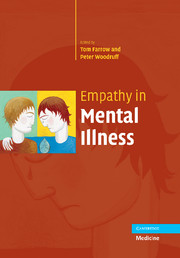Book contents
- Frontmatter
- Contents
- Foreword
- List of contributors
- Part I ‘Dysempathy’ in psychiatric samples
- Part II Empathy and related concepts in health
- Part III Empathy models, regulation and measurement of empathy
- 21 Balancing the empathy expense account: strategies for regulating empathic response
- 22 Empathic accuracy: measurement and potential clinical applications
- 23 A perception-action model for empathy
- 24 The Shared Manifold Hypothesis: embodied simulation and its role in empathy and social cognition
- 25 Using literature and the arts to develop empathy in medical students
- Index
24 - The Shared Manifold Hypothesis: embodied simulation and its role in empathy and social cognition
from Part III - Empathy models, regulation and measurement of empathy
Published online by Cambridge University Press: 17 August 2009
- Frontmatter
- Contents
- Foreword
- List of contributors
- Part I ‘Dysempathy’ in psychiatric samples
- Part II Empathy and related concepts in health
- Part III Empathy models, regulation and measurement of empathy
- 21 Balancing the empathy expense account: strategies for regulating empathic response
- 22 Empathic accuracy: measurement and potential clinical applications
- 23 A perception-action model for empathy
- 24 The Shared Manifold Hypothesis: embodied simulation and its role in empathy and social cognition
- 25 Using literature and the arts to develop empathy in medical students
- Index
Summary
Introduction
Our social mental skills enable us to successfully retrieve the mental contents of others. Sometimes we misrepresent them, henceforth misunderstanding others. Most of the time, though, we are pretty good at understanding what is the goal of others’ behaviour, why the goal was set, and on the basis of which previous elements it was set as such. We are doing it effortlessly and continuously during our daily social interactions. How is that accomplished? The dominant view in cognitive science is to put most efforts into clarifying the formal rules structuring a solipsistic mind. Much less investigated is what triggers the sense of social identity that we experience with the multiplicity of ‘other selves’ populating our social world. Is the solipsistic type of analysis inspired by folk-psychology the best explanatory approach? In particular, is it doing full justice to the phenomenal aspects of our social intentional relations?
As human beings, we do not only mentally entertain an ‘objective’ account of the behaviours constituting the social world in which we live. Beyond phenomenally experiencing the external, objective nature of an observed action, and viewing it as something displayed and acted by an external biological object with distinct qualities, we also experience its goal-directedness or intentional character, similarly to when we experience ourselves as the willful conscious agents of our ongoing behaviour. From a first-person perspective, our dynamic social environment appears being populated by volitional agents capable of entertaining, similarly to us, an agentive intentional relation to the world.
- Type
- Chapter
- Information
- Empathy in Mental Illness , pp. 448 - 472Publisher: Cambridge University PressPrint publication year: 2007
- 3
- Cited by



